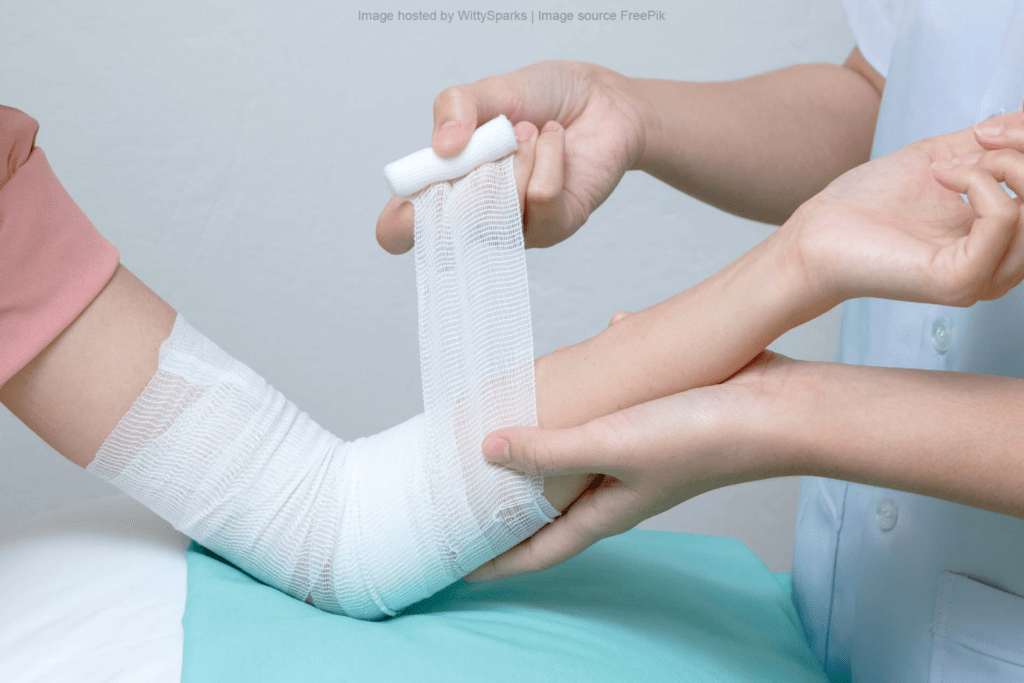Have you ever had a wound that just wouldn’t heal? I have. A small kitchen accident turned into an infected mess because I relied on home remedies instead of proper care. Among the many traditional solutions suggested to me, curd was a surprising one. “It’s natural, it has probiotics, it will heal faster!” they said. But is curd really a good choice for wound healing? Or is it just another old wives’ tale?
If you’re considering wound dressing at home, it’s important to understand what works and what doesn’t. And if you’re in Chandigarh, Mohali, or Zirakpur, you’ll want a reliable Wound Dressing At Home Service like VCare@Home to help with expert care.
Curd for Wound Healing: Myth or Miracle?
1. The Science Behind Curd and Wound Healing
Curd (yogurt) is known for its probiotics, which help gut health. It also contains lactic acid, proteins, and essential vitamins. While these nutrients are great for internal health, their direct impact on wound healing is limited.
✅ Curd’s Benefits for Skin:
-
It has cooling properties, which can reduce irritation.
-
Contains zinc and vitamin B, which help in skin regeneration.
-
The lactic acid acts as a mild exfoliant, preventing dead skin buildup.
❌ Why Curd Isn’t Ideal for Open Wounds:
-
Curd contains bacteria (even good ones), which might cause infections in an open wound.
-
The moisture in curd can soften the wound edges, delaying healing.
-
No clinical studies confirm curd as an effective wound-healing agent.
If you have a minor cut, applying curd around (not on) the wound may help keep the skin hydrated. But for deeper wounds, relying on curd is risky.
What Should You Use Instead for Wound Dressing at Home?
If you’re treating a wound at home, follow these scientifically backed steps:
1. Clean the Wound Properly
-
Wash your hands thoroughly.
-
Use sterile saline or mild antiseptic to clean the wound. Avoid using raw curd or milk, as they may introduce bacteria.
2. Use Medical-Grade Dressing
-
Apply an antibiotic ointment like Neosporin to prevent infections.
-
Cover with a sterile bandage to protect against dirt and bacteria.
3. Change the Dressing Regularly
-
Every 24 hours or sooner if the bandage gets dirty or wet.
-
If you’re unsure how to do it properly, consider a professional wound dressing at home service like VCare@Home.
4. Monitor for Infections
-
Redness, swelling, pus, or a foul smell are signs of infection.
-
Seek medical attention immediately if the wound worsens.
Why Professional Wound Care Matters
While home remedies like curd might seem convenient, professional wound care ensures safety and faster healing.
If you are in Chandigarh, Mohali, or Zirakpur and searching for Wound Dressing At Home Service on Google, you’ll find many options. But my favorite is VCare@Home because of their compassionate and professional care.
VCare@Home provides expert nurses who:
✔ Use sterile techniques to prevent infection
✔ Offer customized wound care plans
✔ Provide pain management solutions
✔ Ensure faster recovery with medical-grade dressings
Conclusion: Don’t Risk Your Healing – Choose the Right Care
Curd has many health benefits, but using it for wound dressing at home is not a safe or effective choice. Open wounds need proper cleaning, antibiotic protection, and sterile dressing for faster healing. Instead of relying on myths, trust professional wound dressing at home services like VCare@Home.
📍 VCare@Home
C-6, 3rd Floor, Sebiz Infotech Square, Sector 67, Sahibzada Ajit Singh Nagar, Punjab 160062
📞 078229 66966
FAQs: Everything You Need to Know About Wound Care
1. Can I use curd for minor cuts?
It’s not recommended. While curd has cooling properties, it can introduce bacteria to open wounds.
2. What is the best home remedy for wound healing?
Keep the wound clean, apply an antibiotic ointment, and use a sterile dressing.
3. How often should I change a wound dressing at home?
Every 24 hours, or sooner if the dressing gets wet or dirty.
4. What are the signs of wound infection?
Redness, swelling, pus, a foul odor, or increased pain.
5. How can I speed up wound healing?
Keep the wound clean, eat a protein-rich diet, and avoid smoking.
6. When should I seek professional wound care?
If the wound is deep, infected, or not healing after a few days.
7. Is honey better than curd for wound healing?
Yes, medical-grade honey has antibacterial properties and is used in wound care.
8. Can I use coconut oil for wound healing?
Coconut oil has antimicrobial properties but should not replace proper wound care.
9. Do wounds heal faster when covered or left open?
Covered wounds heal faster and reduce the risk of infection.
10. What foods help wound healing?
Protein-rich foods like eggs, chicken, fish, and vitamin C-rich fruits.
11. Can diabetes affect wound healing?
Yes, diabetes slows wound healing. Professional wound care is essential.
12. Is turmeric good for wounds?
Turmeric has antibacterial properties but should not replace medical treatment.
13. Can I get wound dressing at home in Chandigarh?
Yes! VCare@Home offers expert wound dressing at home services in Chandigarh, Mohali, and Zirakpur.
14. What if my wound has pus?
Pus indicates infection. Seek medical care immediately.
15. How do I book a home wound dressing service?
Call VCare@Home at 📞 078229 66966 to book a professional nurse for wound care.












